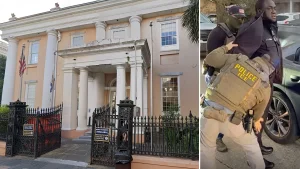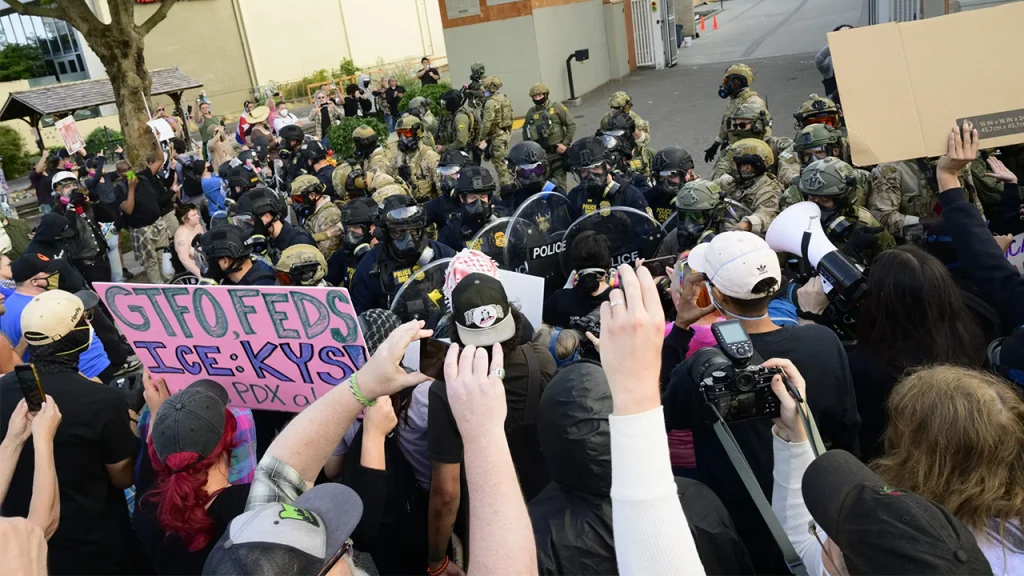Federal Immigration Agents Face Rising Threats and Violence
In a troubling landscape of escalating hostility, Immigration and Customs Enforcement (ICE) agents are experiencing unprecedented levels of threats, harassment, and physical violence. According to the Department of Homeland Security, assaults on ICE personnel have skyrocketed by an alarming 1,000%, creating a work environment where officers serving in law enforcement capacities must increasingly fear for their personal safety and that of their families. This surge in antagonism is exemplified by a disturbing voicemail recently obtained by Fox News Digital, in which the caller expressed hope that ICE agents would be “doxxed one by one” and subjected to “public shaming.” The anonymous caller’s message represents just one instance in a broader pattern of intensifying animosity directed toward federal immigration officials who are tasked with enforcing existing laws.
The situation reached a tragic crescendo on September 24 when a gunman identified as Joshua Jahn allegedly opened fire on an ICE facility in Dallas, killing two individuals and wounding another. The attack appears to have been ideologically motivated, as authorities reportedly discovered ammunition marked with “anti-ICE” inscriptions and notes in the shooter’s home referring to immigration agents as “people showing up to collect a dirty paycheck.” According to the Dallas Observer, Jahn’s writings revealed his intention to “maximize lethality” against ICE personnel, underscoring the extreme nature of the threats these federal employees currently face. This deadly incident has heightened concerns about the safety of immigration enforcement officers, who increasingly find themselves targeted not only while on duty but also in their personal lives.
The harassment of ICE agents has extended beyond the workplace and into their homes and communities. In September, three women were indicted for allegedly pursuing an ICE agent to his residence, livestreaming the pursuit, and then publishing his address on social media. Upon arriving at the officer’s home, the women reportedly shouted phrases such as “neighbor is ICE” and “la migra lives here,” seemingly intending to expose and intimidate the agent within his own neighborhood. In another troubling instance, the spouse of a Texas ICE officer received threatening phone calls, with the caller making disturbing comparisons between ICE agents and Nazis, and ominously suggesting that the officer’s family would face consequences similar to those experienced by Nazis after World War II. These personal attacks represent a concerning trend of targeting not just agents themselves but also their innocent family members.
DHS Assistant Secretary Tricia McLaughlin has attributed the rise in hostility to inflammatory rhetoric that compares ICE to historical oppressive forces such as “the Nazi Gestapo, the Secret Police, and slave patrols.” In a statement responding to the threatening voicemail, McLaughlin emphasized that “the violence and dehumanization of these men and women who are simply enforcing the law must stop.” She highlighted the often-overlooked human dimension of immigration enforcement, noting that ICE and Customs and Border Protection officers are “fathers and mothers, sons and daughters” who “risk their lives every day to arrest murderers, pedophiles, rapists, terrorists, and gang members from our communities.” Her comments reflect the department’s growing concern that heated political discourse surrounding immigration policy is creating real-world dangers for those tasked with enforcement.
The Department of Homeland Security has recently called upon “sanctuary politicians” and media outlets to moderate their rhetoric regarding immigration enforcement, suggesting that inflammatory language contributes to the increasing threats faced by agents. This appeal comes as various jurisdictions across the United States have established policies limiting cooperation with federal immigration authorities. In cities like Chicago, the implementation of “ICE-free zones” has reportedly complicated enforcement operations and potentially emboldened protesters. According to DHS, the combination of restrictive local policies and heightened anti-ICE sentiment has created an environment where agents face not only physical dangers while performing their duties but also intimidation and harassment that follows them into their private lives.
The legal system has begun to respond to these threats against federal immigration personnel. Acting U.S. Attorney Bill Essayli, commenting on the indictment of the three women who allegedly doxxed an ICE agent, stated that “the conduct of these defendants are deeply offensive to law enforcement officers and their families,” adding a stern warning that those who “threaten, dox, or harm in any manner one of our agents or employees” will face “prosecution and prison time.” This response reflects the government’s recognition of the severity of the situation and determination to protect its law enforcement personnel. As tensions surrounding immigration policy continue to simmer in the American political landscape, the safety of federal agents tasked with enforcement remains precarious, caught between their duty to uphold the law and a rising tide of hostility that increasingly puts them and their loved ones at risk.














